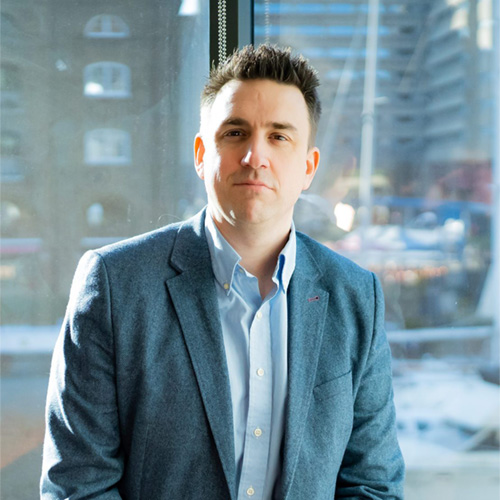
What would you describe as your most memorable achievement?
I tend to focus on the people aspect of success that I’ve experienced. Many years ago, I led an outsourcing project which impacted 180 people. Bearing in mind, in this situation the people impacted were facing a new role that we were moving them into, or redundancy. The success, however, came in an employee satisfaction survey we completed afterwards, where we received only one passive and one detractor result. The other 178 people fed back that they felt engaged and empowered at the end of the process. This was because we did it in the right way and we were empathetic and respectful throughout the duration.
What first made you think of a career in technology?
I love doing things that people say cannot be done and using technology to do it. That’s not to say I always can, but whatever it is, if people tell me I can’t, you can bet I will gravitate towards it. And it is that drive to solve problems that led me to IT.
Early in my career, I was lucky enough to be in the beginning stages of Argos’ home delivery business. At the time the company delivered mobile phones and big items, like furniture, but we wanted to expand and deliver smaller items. No one thought it could be done – it appeared too costly and no one believed customers would pay for delivery for such small items. But we made it happen and it quickly evolved. This was 20 years ago, pre-Amazon – it had never been done before. This is what got me into technology – taking what seemingly couldn’t be done and doing it using technology. From the website through to the logistics, it absolutely fascinated me.
What style of management philosophy do you employ with your current position?
There are a few moments in my career that have made me change the way I operate. One of these was during a training course on the art of delegation. The lecturer said that most people delegate tasks but do not delegate accountability, where you fully give an activity to a team member and the accountability of that task – the checking in and approvals (which are for the benefit of the manager, not the person doing the task) – is on the helper, not the delegator.
After this, I changed the way I operated. For example, I no longer approve anyone’s holiday, I automatically approve it. I put the accountability on my team to make sure they have the right people in place to cover them while they’re away. I trust my people and I delegate that accountability.
If you don’t trust your employees and give them the freedom to grow and try out their ideas, you will never get the most out of them.
What do you think has emerged as the technology trend of 2023 and why?
A buzzing trend right now is ChatGPT, but I think potentially for the wrong reasons. It is a marketing trend, not a tech trend – the technology isn’t new. I think with a lot of technology trends, it is more about whether we can accept it as a human race and as a business, versus whether it can do the thing we need it to.
AI and machine learning have been emerging for some years and there are some truly amazing products out there. I think ChatGPT has started to challenge the concept of ‘do I trust AI?’ and people are becoming more comfortable with using it than they would have been using another similar type of AI 12 months ago. ChatGPT has made AI the most accessible and understandable it’s ever been and people are starting to use it and engage with it.
What do you currently identify as the major areas of investment in your industry?
I think there are two major areas and they link into each other.
The first is ‘invest to save’. Organisations are moving away from legacy systems and instead investing in asset-light technologies, like SaaS or cloud-based technologies, to enable them to have a service on demand that allows them to ramp up and down as needed. This gives organisations greater control to optimise costs and roll out faster, generating cost savings. The idea of ‘invest to save’ is not new, but given current economic challenges, especially in the UK, it is becoming more prominent.
The second is ‘save to secure’, where organisations reinvest the money they would have spent but aren’t doing so now they are on that cloud-based SaaS, on making sure their environment is secure. Security has gone from being something that businesses know they need, to something that IT has to get done, to being embedded into business strategy, and I have seen this shift in the boardroom too.
These two areas, saving and security, often work together to cause the problem because cybercriminals know that businesses are under budgetary strain and will be taking more risks with their security in a bid to save on cost. This is the perfect situation for cybercriminals to exploit. So yes, it is important to create a more flexible, asset-light environment, but equally businesses need to ensure that the environment is secure.
How do you deal with stress and unwind outside of the office?
Since lockdown, I don’t do the routine activities, like a morning and evening walk, quite as much as I did during that period and it is harder to find that logical split between work and home. Recently, I started doing carpentry – making a bar for the garden.
If you could go back and change one career decision, what would it be?
There are lots of things I’ve done wrong or that I would perhaps choose to do differently of course. But if I did go back and change these decisions, would I be where I am today?
What are the region-specific challenges when implementing new technologies in Europe?
I would say the major one is data sovereignty. It is a minefield. Some people overcomplicate it and worry too much, whereas others don’t worry enough. It is a massive consideration when deploying technology into different countries – where is the data hosted, how is it accessed, etc.
What changes to your job role have you seen in the last year and how do you see these developing in the next 12 months?
From an organisational perspective, with the current UK climate, my role has become a lot more commercial – I am more ROI focused. From a customer perspective, it has become about demonstrating how your business can add value and why it is different.
We are here to provide a service and our goal is to help people succeed. I think the same reasons why my job has become a bit more commercial are the same reasons why our customers are demanding us to focus more on that value piece and how we make a difference to them in the service. And I’m massively encouraging this change.
What advice would you offer somebody aspiring to obtain a C-level position in your industry?
Focus on the customer, understand what they are trying to achieve and make sure you don’t become obsessed with whatever the latest technology is. Instead focus on how that tech can help teach customers and help them grow their businesses.
A few years ago, I had the mindset that a good CIO was about being the most knowledgeable on all technologies. But I quickly learnt that this isn’t the case. You can know all the technology in the world, but it is useless unless you understand how to create the capabilities around you, leverage the technology and deliver that value back to the customer.
Click below to share this article

